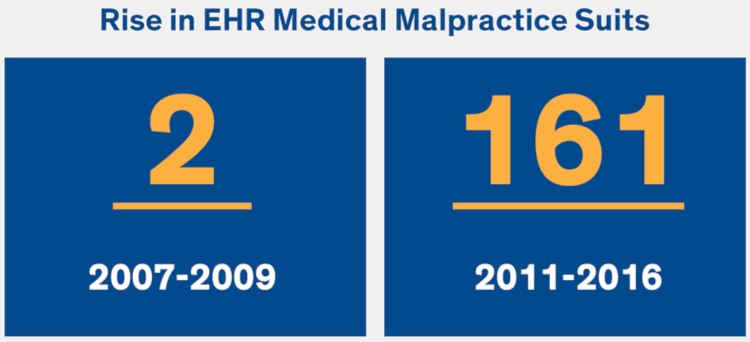 The following is a guest blog post by Justin Campbell, Vice President, Strategy, at Galen Healthcare Solutions.
The following is a guest blog post by Justin Campbell, Vice President, Strategy, at Galen Healthcare Solutions.
Successful healthcare data archiving with minimal risk requires preservation of the legal medical record (as defined by the organization), data sets such as contextual audit trails, referenced data in ancillary systems, data change and version history, and even database metadata. A navigable audit trail is essential if we want to relate the precise sequence of events; this trail provides evidence that justifies and/or explains what actions have occurred. It is also vital to satisfy e-Discovery requests.
In retiring clinical systems, it is essential to evaluate the data that must be archived and equally crucial to assess the workflows driving interaction between systems. From a legal perspective, when providers use either primary (EHR, EMR) or ancillary (LIS, RIS, PIS, PACS, Perinatal) clinical systems as a diagnostic reference for clinical decision making, the data becomes part of the longitudinal medical record. Providers may not see a need for preservation of a particular workflow in ancillary systems, but the Health Information Management department should.
Archiving of Contextual Audit Trails, Telemetry Data and Metadata
The archiving of clinical data is essential for system retirement, but audit data sets must also be considered. For instance, the laboratory information system must meet the requirements of hospital accreditation agencies, HIPAA, and other clinical medical practitioners. Furthermore, electronically stored information is subject to discovery requests and legal motions. The Doctors Company, the nation’s largest physician-owned medical malpractice insurer, published a study in October of 2017, highlighting the rise of EHR-related malpractice suits. The study revealed that claims in which EHRs are a factor increased from just two between 2007 and 2009 to 161 from 2011 to December 2016. Legally, the archival solution must store the same data as the legacy EHR it replaced.

Referenced Data in Ancillary Systems
Healthcare delivery organizations have historically designated their Health Information Management (“HIM”) departments as the official “custodians of medical records.” Most of these departments process and respond to subpoenas from courts, attorneys, and other sources. Therefore, it is critical that commonly missed data sets, as well as those in ancillary systems, be incorporated into a healthcare organization’s approach to information governance, including the establishment of policies to guide responses to discovery requests.
Scenario #1: Surgical Equipment Recall
A device manufacturer issues a recall of equipment used for surgeries. To minimize risk, the hospital must determine which patients may have been affected by the faulty equipment. In archiving, the review can be facilitated by linking the serial number stored in the materials management system to the patient’s records in the legacy EMR. Failure to identify and subsequently notify patients of the recall could have drastic consequences for the patient’s health, which in turn could create liability.
Scenario #2: OIG Audit
Healthcare clinicians and organizations receive funding from various government sponsored initiatives, but release of these funds can sometimes be held up pending an audit of sensitive EMR data. This audit process could be triggered by:
- Subpoena, a civil investigative demand, or a letter notifying the recipient of an intent to audit. Such a request would stipulate the need for access to all relevant records, reports, and previous audits (including potential legislative inquiries) and could be triggered by a report of suspected wrongdoing.
- Meaningful Use incentive payment appraisals demanding verification that providers receiving Medicare and/or Medicaid Meaningful Use incentive payments were entitled to them.
The manner in which a data archiving system organizes data from primary and ancillary clinical systems, and how relationships between these systems and the primary EMR system are preserved is critical not solely for the purposes of medical continuity, but business continuity as well. A comprehensive archiving solution organizes data from both primary and ancillary clinical systems and presents it in ways that emulate the original systems’ documentation workflow.
Want to learn more about the legal challenges with archiving legacy systems in healthcare? Download the full whitepaper, Legal Considerations for Healthcare Data Archiving, which covers the many legal considerations to evaluate when navigating the complex data structure and data sets, legal and compliance requirements, and continuity of care requirements that characterize effective healthcare legacy application retirement.
About Justin Campbell
Justin is Vice President, Strategy, at Galen Healthcare Solutions. He is responsible for market intelligence, segmentation, business and market development and competitive strategy. Justin has been consulting in Health IT for over 12 years, guiding clients in the implementation, integration and optimization of clinical systems. He has been on the front lines of system replacement and data migration, and is passionate about advancing interoperability in healthcare and harnessing analytical insights to realize improvements in patient care. Justin can be found on Twitter at @TJustinCampbell and LinkedIn.
About Galen Healthcare Solutions
Galen Healthcare Solutions is an award-winning, KLAS-ranked healthcare IT technical and professional services and solutions company providing high-skilled, cross-platform expertise and proud sponsor of the Healthcare Data Archiving Series. For over a decade, Galen has partnered with specialty practices, hospitals, health information exchanges, health systems and integrated delivery networks to provide data conversion and archival solutions. Galen has competed over 500 successful data conversion & archiving projects and has experience with over 100 unique systems. Their archiving solution, VitalCenter Online, was recognized by KLAS in their inaugural report, Legacy Data Archiving 2019 A First Look at a Changing Market, for the accuracy and accessibility of its data and for its industry-leading commitment to customer experience. The report showed that “Galen has the highest percentage of customers who report high satisfaction” with a tool that is “exceptionally easy to use” for keeping patient data in context. For more information, visit www.galenhealthcare.com. Connect with us on Twitter, Facebook and Linke













